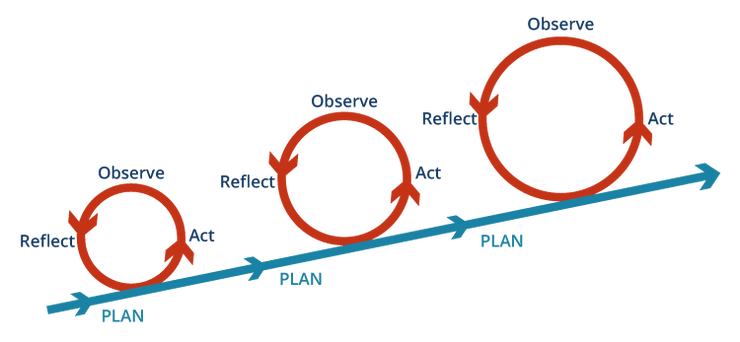
Action Research Coursework Example
Introduction
This section dwells on my experience as a learner of action research and its application to organizational practices. When I started being engaged with MBA process, I did not realize that there existed various methods of research as I mainly used the quantitative and qualitative ones. Statistics was primary for me, but only after studying this module I understood that any process or phenomenon is multi-faceted and thus should be investigated using various methods. Action research is one of the important approaches in an organization. It has inside and outside perspectives, which are both realized in four stages: diagnosing, planning, taking action, evaluation of action (Coghlan, 2011). In reality, it looks like solving daily tasks with high performance. Interestingly, action research is a cyclic process because evaluation of action might require diagnosing with all the further stages that are important for organization development.
Body
I believe that action research is a new important trend in 21st century organization management. In particular, I think that insider action research is particularly valuable for the development of new organizational capabilities, because only an insider is aware of how business is done in a particular company, its ‘red and hot issues’, so that the appropriate changes could be initiated. Of course, in comparison with outsider research, an insider one faces some serious challenges, such as the need to combine multiple roles, to be an active political player, to build new concepts of learning, etc. (Roth et al., 2007).
Perhaps, one of the few things that remained unchanged before and after studying this module is my attitude to organizational research as an important process that should be conducted for the development of effective management practices. However, this module allowed me to broaden my knowledge by adding some of the interesting concepts, like the “quality of being”, “attitude of inquiry” of an action research, which is winning position in organizational research effectively opposing such approaches as positivism, objectivism, etc. (Marshall et al., 2007). I am deeply convinced that action research will supersede the traditional methods, as it concentrates mainly on finding solutions to immediate problems, which is important for organizational research and development.
Action research, especially at the organizational level, allows to build a more comprehensive approach to analysis of organizational performance. This analysis is vital for recognition of strength and weaknesses of an organization and their further elimination. Coghlan et al. are right to assert that in an organization each level (individual, group, interdepartmental, organizational) has dynamic relationship with others (Coghlan, 2002). If to account for this peculiarity, it becomes clear that the whole organization as a system cannot be treated out of the premises of traditional positivist and other approaches; instead, action research comes to foreground as an approach that is able to give value and meaning to organizational processes that take place on a daily basis.
Conclusion
As a manager of an organization and a leader of people I am sure that I can utilize action research for building a problem-free corporative environment by promptly analyzing the arising issues, planning and implementing interventions. I think, this approach is valuable, because it allows quick reactions to the existing organizational issues in the respective contexts.
References
- Coghlan, D., 2011. ‘Action Research: Exploring Perspectives on a Philosophy of Practical Knowing’, Academy Of Management Annals, 5, 1, pp. 53-87, Business Source Complete, EBSCOhost.
- Coghlan, D., 2002. ‘Interlevel Dynamics in Systemic Action Research’, Systemic Practice And Action Research, 15, 4, pp. 273-283, Social Sciences Citation Index, EBSCOhost.
- Marshall, J., & Reason, P., 2007. ‘Quality in Research as “Taking an Attitude of Inquiry”’, Management Research News, 30, 5, pp. 368-380, Business Source Complete, EBSCOhost.
- Roth, J., Shani, A., & Leary, M., 2007. ‘Insider Action Research: Facing the Challenges of New Capability Development within a Biopharmacompany’, Action Research, 5, 1, pp. 41-60, PsycINFO, EBSCOhost.